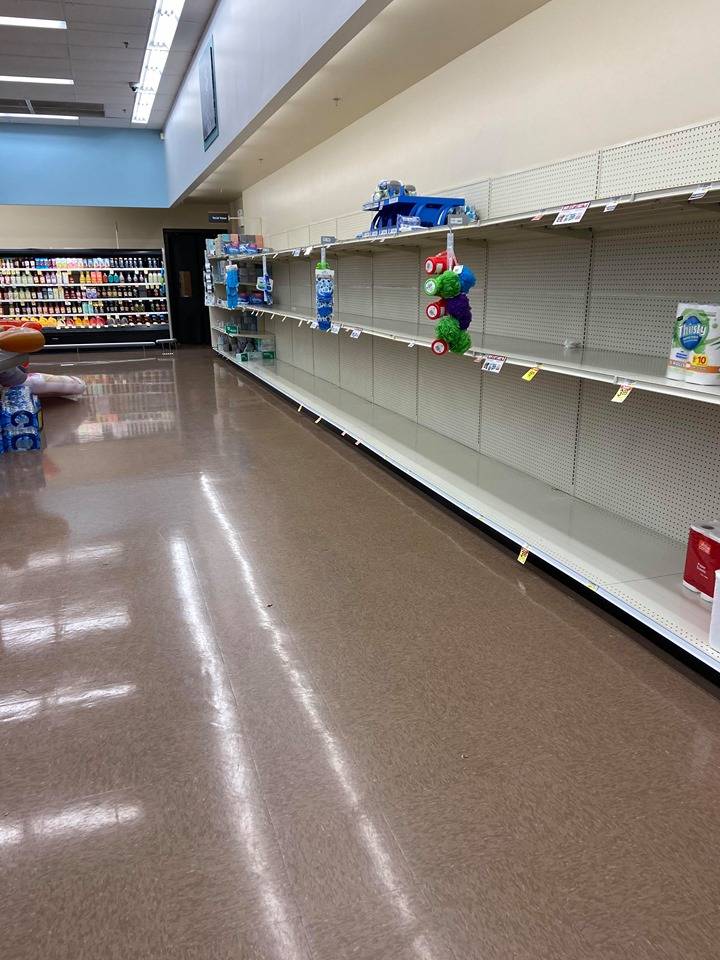Why are we panicking about the coronavirus?
Walk into any grocery store and you will instantly see how people have reacted to the coronavirus outbreak with panic. Panic has overwhelmed any form of rational thinking.
At our local grocery stores, I observed shopping cart after shopping cart filled to the top and long lines to check out. Empty shelves were everywhere.
In the parking lots, I saw people with four or five carts full of grocery items that they were loading into coolers and plastic bins in their vehicles. Some carts had cases and cases of bottled water. A rational thought process would reason out that we aren’t running out of food, that the stores would be resupplied from their warehouses, and that the water from your tap is perfectly OK to drink. But that is not what is taking place.
Don’t panic is a common refrain from health professionals, government officials, and laypeople as they aim to quell people’s fears about the novel coronavirus. So why are people panicking? Human survival has depended on both fear and anxiety, requiring us to react immediately when we encountered a threat. Think “fight or flight”. When we encounter a dangerous situation our first reaction is to get away from the danger as rapidly as possible or to put up a fight. Only later after the danger has passed and when our fear subsides does our rational part of our brain think about “how can I avoid getting into this dangerous situation in the future?” We panic when the emotional part of our brain overwhelms the rational part. Our brains short-circuit and our behavior changes. Buying excessive amounts of grocery items and leaving none for the next person is an example of that change.
A primary cause of this panicked reaction is that there are too many questions and not enough solid information about the virus and its potential consequences to us. The initial information seems to point to it being serious but it’s far too early to have an accurate picture of just how serious. If we have more information, it allows our brains to process more rationally. But there is a lack of solid factual information and what information we do get is often conflicting. People need ways of alleviating their anxiety, so clear instructions about risks and behaviors are essential to lessening our fears. People need to feel that they have some control over the situation and taking action, even if its irrational action, helps lessen their panic. When people panic shop and buy in excess it is their way of exercising some control in a situation where they don’t know how to react or what to expect.
There are other ways to take action. In the case of protecting yourself from the coronavirus, that means, at the very least, taking precautions like washing and drying your hands thoroughly and frequently, and avoiding people who are sick. If you’re at higher risk for contracting and getting sick from the illness, like older Americans and those with conditions including heart disease and diabetes, avoid places with crowds. Taking action can also mean finding ways to help those around you, maybe by bringing an elderly neighbor their groceries or medications.
We tend to resist when people tell us how to conduct our lives. We especially resent it when it’s the government telling us what to do. Some amount of anxiety can be good in the face of disaster. Fear can be a motivator, raising our alertness and energy levels as long we don’t allow that fear to turn into panic. Even though we may initially want to ignore an order to stay at home and avoid contact with others, we know so very little about this virus and its long-term effects we may want to temper our impulse to ignore the governor’s order. When more is known we will be able to better decide for ourselves what course of action we should pursue.
In the meantime, make the best of it. Find ways to be productive and not dwell on the negative. Maybe share some of those 48 rolls of toilet paper, 12 gallons of milk, and 24 loaves of bread you bought. We haven’t faced anything like this for decades, so there is no playbook on how to act. We will get through this if we control our panic and take positive action.
Tim Burke is a businessman, philanthropist, educator and Pahrump resident. Contact him at timstakenv@gmail.com
















